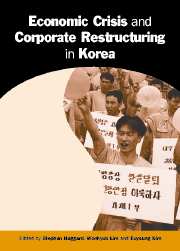Book contents
- Frontmatter
- Contents
- List of Figures
- List of Tables
- Preface and Acknowledgements
- Contributors
- A Note on Usage
- Abbreviations
- 1 Introduction: The Political Economy of Corporate Restructuring
- Part I The Politics and Economics of the Chaebol Problem
- Part II The Political Economy of Crisis Management
- Part III Reform and Restructuring
- 9 The Corporate Bankruptcy System and the Economic Crisis
- 10 Foreign Direct Investment and Corporate Restructuring after the Crisis
- 11 Competition Law and Policy
- 12 Reform of Corporate Governance
- 13 Conclusion: Whither the Chaebol?
- Index
12 - Reform of Corporate Governance
Published online by Cambridge University Press: 05 July 2014
- Frontmatter
- Contents
- List of Figures
- List of Tables
- Preface and Acknowledgements
- Contributors
- A Note on Usage
- Abbreviations
- 1 Introduction: The Political Economy of Corporate Restructuring
- Part I The Politics and Economics of the Chaebol Problem
- Part II The Political Economy of Crisis Management
- Part III Reform and Restructuring
- 9 The Corporate Bankruptcy System and the Economic Crisis
- 10 Foreign Direct Investment and Corporate Restructuring after the Crisis
- 11 Competition Law and Policy
- 12 Reform of Corporate Governance
- 13 Conclusion: Whither the Chaebol?
- Index
Summary
In Korea, the term corporate governance was rarely mentioned until the economic crisis in 1997, despite a long-standing controversy over the way Korean chaebol are managed and governed. When the economic crisis hit, however, a consensus emerged that the high leverage, over-diversification, and the resulting weak competitiveness of Korean corporations could be traced to poor corporate governance. The discretionary power of the chairman and his control over resource allocation decisions lie at the center of this line of criticism. The chairman could exercise such discretionary power and control because of the ownership structure of the chaebol and the lack of checks and balances.
Ownership structure has been an important subject in modern economics. The literature has focused on the potential conflicts of interest between owners (shareholders) and managers, or the principal-agent problem. Jensen and Meckling (1976) show that as managerial ownership increases, the interests of management become more closely aligned with those of shareholders. The “convergence-of-interest” hypothesis suggests that a firm's performance and value increase as the managers’ stake in the firm's future cash flows increases.
On the other hand, the entrenchment hypothesis predicts the opposite. When managerial ownership is low, firm performance is maximized because of the threats from various markets such as the capital market, he managerial labor market (Fama 1980), and the market for corporate control (Shleifer and Vishny 1986). However, when managerial ownership is high enough to provide effective control and to guarantee their jobs, managers will indulge their preference for non-value-maximizing behavior.
- Type
- Chapter
- Information
- Economic Crisis and Corporate Restructuring in KoreaReforming the Chaebol, pp. 286 - 306Publisher: Cambridge University PressPrint publication year: 2003
- 3
- Cited by



